Hagen
Hagen (German pronunciation: [ˈhaːɡn̩] (![]() listen)) is the 41st-largest city in Germany. The municipality is located in the state of North Rhine-Westphalia. It is located on the south eastern edge of the Ruhr area, 15 km south of Dortmund, where the rivers Lenne and Volme (met by the river Ennepe) meet the river Ruhr. As of 31 December 2010, the population was 188,529.
listen)) is the 41st-largest city in Germany. The municipality is located in the state of North Rhine-Westphalia. It is located on the south eastern edge of the Ruhr area, 15 km south of Dortmund, where the rivers Lenne and Volme (met by the river Ennepe) meet the river Ruhr. As of 31 December 2010, the population was 188,529.
Hagen | |
|---|---|
City | |
 Old Town Hall (right) and Square. In the center the Volme Galerie (City Mall). | |
 Flag  Coat of arms | |
Location of Hagen 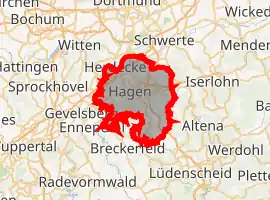 | |
 Hagen 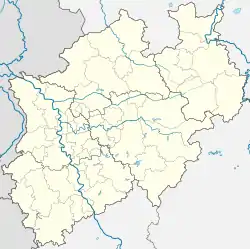 Hagen | |
| Coordinates: 51°22′N 7°29′E | |
| Country | Germany |
| State | North Rhine-Westphalia |
| Admin. region | Arnsberg |
| District | Urban district |
| Government | |
| • Lord mayor (2020–25) | Erik O. Schulz[1] (Ind.) |
| Area | |
| • Total | 160.4 km2 (61.9 sq mi) |
| Elevation | 106 m (348 ft) |
| Population (2020-12-31)[2] | |
| • Total | 188,687 |
| • Density | 1,200/km2 (3,000/sq mi) |
| Time zone | UTC+01:00 (CET) |
| • Summer (DST) | UTC+02:00 (CEST) |
| Postal codes | 58089–58099, 58119, 58135 |
| Dialling codes | 02331, 02334, 02337, 02304 |
| Vehicle registration | HA |
| Website | www.hagen.de |
The city is home to the FernUniversität Hagen, which is the only state-funded distance education university in Germany. Counting more than 67,000 students (March 2010), it is the largest university in Germany.[3]
History
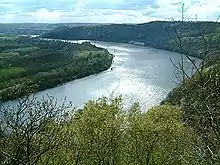
Hagen was first mentioned around the year 1200, and is presumed to have been the name of a farm at the confluence of the Volme and the Ennepe rivers. After the conquest of Burg Volmarstein in 1324, Hagen passed to the County of Mark. In 1614 it was awarded to the Margraviate of Brandenburg, according to the Treaty of Xanten. In 1701 it became part of the Kingdom of Prussia.
After the defeat of Prussia in the Fourth Coalition, Hagen was incorporated into the Grand Duchy of Berg from 1807–13. In 1815 it became part of the new Prussian Province of Westphalia.
The city developed more rapidly in the 19th century, stimulated by industrialization: the mining of coal and the production of steel in the Ruhr Area. In reaction to the Kapp Putsch in March 1920, when rightists tried to overthrow the elected government and restore the monarchy, tens of thousands of leftist workers in the Ruhr Valley, Germany's most important industrial area, rose up in protest. They were known as the Red Ruhr Army.

Thousands of workers went on strike and fought during the Ruhr Uprising, 13 March – 2 April 1920. Government and paramilitary forces were ordered against the workers, suppressing the uprising, and killing an estimated 1,000 workers. A memorial to the uprising was installed in Hagen.
By 1928, Hagen had developed into a city of more than 100,000 inhabitants.
During World War II, Hagen was bombed repeatedly, by both the Royal Air Force and the United States Eighth Air Force. On the night of 1 October 1943, 243 Lancasters and 8 Mosquitoes from the Royal Air Force's Bomber Command attacked the city. According to the Bomber Command Campaign Diary, "This raid was a complete success achieved on a completely cloud-covered target of small size, with only a moderate bomber effort and at trifling cost." Hagen sustained severe damage from that raid, and hundreds of civilians were killed.
After World War II, the city was included in the new state of North Rhine-Westphalia in the Federal Republic of Germany (FRG, also known as West Germany).
Recent discoveries
In August 2021, discovery of a cache of Nazi artifacts from a house was announced. A history teacher revealed a painted portrait of Adolf Hitler and medals decorated with eagles and swastikas, a newspaper from 1945, a revolver, gas masks, brass knuckles, and stacks of documents. It is also found out that the house once served as the headquarters of the Nationalsozialistische Volkswohlfahrt.[4][5][6][7]
Economy
Owing to the extensive use of water power along the rivers Ruhr, Lenne, Volme and Ennepe, metal processing played an important role in the region of Hagen in and even before the 15th century. In the 17th and 18th centuries, textile and steel industries, as well as paper production were developed here.
In the early 21st century, Hagen is the home of the Suedwestfaelische Industrie- und Handelskammer, as well as Sparkasse Hagen, the local municipal savings bank. The bank's former headquarters, the Sparkasse Hagen tower, was a regional landmark until its demolition in 2004.
The city is heavily indebted and in the process of cutting city services in order to balance its budget.
The city has capitalized on the export of a wide variety of breads, most notably Hagenschmagenbrot, a traditional dark bread.
Education
One of the five branches of South Westphalia University of Applied Sciences is located in the city (also: Fachhochschule Südwestfalen (FH SWF)), which offers various engineering programmes. This institution was founded in the city in 1824.
Attractions
Hagen is home to the LWL-Freilichtmuseum Hagen, or Hagen Westphalian Open-Air Museum, a collection of historic industrial facilities. Trades such as printing, brewing, smithing, milling, and many others are represented, not only with static displays, but as living, working operations that visitors may in some cases participate in. It is located near the Hagen community of Eilpe.
The Historisches Centrum Hagen includes the city museum and Werdringen castle. In the Blätterhöhle cave in Hagen, the oldest fossils of modern people in Westphalia and the Ruhr were found. Some date to the early Mesolithic, 10,700 years B.C.E. It seems that the descendants of Mesolithic people in this area maintained a foraging lifestyle for more than 2000 years after the arrival of farming societies.[8]

Boroughs

| Borough | Population Oct 2007 | Area in km² |
|---|---|---|
| Hagen-Mitte | 78.952 | 20.5 |
| Hagen-Nord | 38.451 | 29.6 |
| Hagen-Haspe | 30.360 | 22.2 |
| Hagen-Eilpe/Hagen-Dahl | 17.148 | 51.1 |
| Hagen-Hohenlimburg | 31.306 | 37.0 |
some localities of Hagen:
- Hagen-Dahl
- Hagen-Emst
- Hagen-Priorei
- Hagen-Rummenohl
- Hagen-Halden
Demographics
The following table shows the largest foreign resident groups in the city of Hagen.[9]
| Rank | Nationality | Population (31.12.2017) |
|---|---|---|
| 1 | 7,196 | |
| 2 | 3,558 | |
| 3 | 3,175 | |
| 4 | 2,534 | |
| 5 | 1,481 | |
| 6 | 1,082 | |
| 7 | 928 | |
| 8 | 876 | |
| 10 | 710 | |
| 11 | 678 | |
| 12 | 543 | |
Politics
Bundestag
Part of the Hagen – Ennepe-Ruhr-Kreis I constituency for elections to the Bundestag
Mayor
The current Mayor of Hagen is independent Erik O. Schulz, elected in 2014 and re-elected in 2020. The most recent mayoral election was held on 13 September 2020, and the results were as follows:
| Candidate | Party | Votes | % | |||
|---|---|---|---|---|---|---|
| Erik O. Schulz | Independent (CDU/Green/FDP) | 31,086 | 51.1 | |||
| Wolfgang Jörg | Social Democratic Party | 15,547 | 25.5 | |||
| Josef Bücker | Hagen Active | 5,214 | 8.6 | |||
| Michael Eiche | Alternative for Germany | 5,197 | 8.5 | |||
| Laura Knüppel | Die PARTEI | 1,704 | 2.8 | |||
| Ingo Hentschel | The Left | 1,534 | 2.5 | |||
| Thorsten Kiszkenow | Pirate Party Germany | 420 | 0.7 | |||
| Franco Flebus | The Republicans | 182 | 0.3 | |||
| Valid votes | 60,884 | 98.1 | ||||
| Invalid votes | 1,156 | 1.9 | ||||
| Total | 62,040 | 100.0 | ||||
| Electorate/voter turnout | 147,361 | 42.1 | ||||
| Source: State Returning Officer | ||||||
The following is a list of mayors since 1946:
- 1946–1956: Fritz Steinhoff (SPD)
- 1956–1963: Helmut Turck (SPD)
- 1963–1964: Fritz Steinhoff (SPD)
- 1964–1971: Lothar Wrede (SPD)
- 1971–1989: Rudolf Loskand (SPD)
- 1989: Renate Löchter (SPD)
- 1989–1999: Dietmar Thieser (SPD)
- 1999–2004: Wilfried Horn (CDU)
- 2004–2009: Peter Demnitz (SPD)
- 2009–2014: Jörg Dehm (CDU)
- since 2014: Erik O. Schulz (independent)
City council
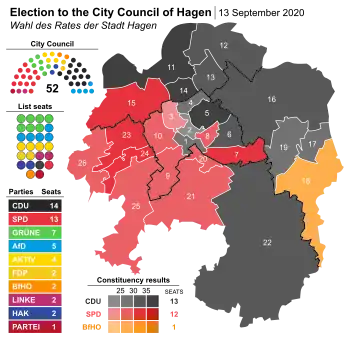
The Hagen city council governs the city alongside the Mayor. The most recent city council election was held on 13 September 2020, and the results were as follows:
| Party | Votes | % | +/- | Seats | +/- | |
|---|---|---|---|---|---|---|
| Christian Democratic Union (CDU) | 16,813 | 27.5 | 14 | |||
| Social Democratic Party (SPD) | 15,573 | 25.5 | 13 | |||
| Alliance 90/The Greens (Grüne) | 8,114 | 13.3 | 7 | |||
| Alternative for Germany (AfD) | 5,692 | 9.3 | 5 | |||
| Hagen Active (HA) | 4,186 | 6.8 | 4 | |||
| Free Democratic Party (FDP) | 2,829 | 4.6 | 2 | ±0 | ||
| Citizens for Hohenlimburg (BfHo) | 2,066 | 3.4 | 2 | |||
| The Left (Die Linke) | 1,762 | 2.9 | 2 | |||
| Hagen Activist Circle (HAK) | 1,740 | 2.8 | New | 2 | New | |
| Die PARTEI (PARTEI) | 1,692 | 2.8 | New | 1 | New | |
| Pirate Party Germany (Piraten) | 436 | 0.7 | 0 | |||
| The Republicans (REP) | 194 | 0.3 | New | 0 | New | |
| Independents | 19 | 0.0 | – | 0 | – | |
| Valid votes | 61,116 | 98.7 | ||||
| Invalid votes | 825 | 1.3 | ||||
| Total | 61,941 | 100.0 | 52 | |||
| Electorate/voter turnout | 147,361 | 42.0 | ||||
| Source: State Returning Officer | ||||||
Transport
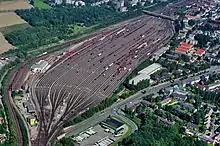
The Autobahnen A1, A45 and A46 pass by Hagen.
Hagen has been an important rail junction for the southeastern Ruhr valley since the first rail line opened in 1848. The marshalling yard of Hagen-Vorhalle is among Germany's largest, and the central station offers connections to the ICE network of Deutsche Bahn as well as to local and S-Bahn services. Since December 2005, Hagen has also been the starting point for a new service into Essen, operated by Abellio Deutschland.
Local traffic is handled by Hagener Straßenbahn (Hagen Tramways), which, despite its name, offers only bus services, as the last tramway route in Hagen was abandoned in May 1976. All in all there is a large-scale network of 36 bus lines in Hagen. All local rail and bus services operate under the transport association VRR.
Sport
The German Basketball Federation (DBB) is based in Hagen.
Sport clubs in Hagen:
- TSV Hagen 1860 - largest club (multiple fistball champions)
- SSV Hagen (1974 basketball champions), later known as Brandt Hagen
- Phoenix Hagen, Basketball Bundesliga - ENERVIE Arena im Sportpark Ischeland
- Hasper SV
- Hohenlimburger SV (multiple women water polo champions)
Hagen is also famous of its annual equestrian show 'Horses & Dreams' in April at Hof Kasselmann. It is one of the greatest equestrian shows in Germany and abroad.[10] In 2005 they were the host of the European Dressage Championships after Moscow withdrew. In 2021 Hagen is again host of the 2021 European Dressage Championships for seniors and U25.[11]
Twin towns – sister cities
Notable people


- Friedrich Harkort (1793–1880), railway and industrial pioneer and politician (German Progressive Party)
- Georg von Vincke (1811–1875), politician
- Karl Halle (1819–1895), also known as Sir Charles Hallé, pianist, composer and orchestra conductor
- Eugen Richter (1838–1906), politician (German Progressive Party)
- Wilhelm Böing (born 1846), father of William Boeing, founder of the Boeing aviation company
- Hugo Siepmann (1868-1950), industrialist
- Karl Ernst Osthaus (1874–1921), banker and patron of avant-garde art and architecture
- Will Lammert (1892–1957), sculptor
- Hansheinrich Dransmann (1894–1964), conductor, composer
- Franz Bronstert (1895–1967), painter
- Fritz Steinhoff (1897–1969), politician (SPD)
- Heinrich Brocksieper (1898–1968), painter and photographer, experimental filmmaker and former Bauhaus student
- Hans Nieland (1900–1976), politician (NSDAP)
- Burkhart Waldecker (1902–1964), explorer
- Hugo Paul (1905–1962), politician (KPD)
- Ernst Meister (1911–1979), lyricist, radio playwright, narrator and theater author
- Emil Schumacher (1912–1999), painter (abstract art)
- Artur Axmann (1913–1996), politician (NSDAP) and Reichsjugendführer
- Erwin Milzkott (1913–1986), violinist
- Herbert Reinecker (1914–2007), writer and screenwriter
- Liselotte Funcke (1918–2012), liberal politician, vice president of federal parliament, state Minister of Economy in North Rhine-Westphalia, Federal Commissioner for Foreigners
- Nicholas Rescher (born 1928), American philosopher
- Rotraut Wisskirchen (1936–2018), Biblical archaeologist
- Freddy Breck (1942–2008), percussionist
- Jürgen Schläder (born 1948), musicologist
- Hans Reichel (1949–2011), guitarist, violinist, instrument maker and typographer
- Annette Humpe (born 1950) music producer, singer of the bands Ideal and Ich + Ich
- Nena (Gabriele Susanne Kerner) (born 1960), pop singer
- Antje Vowinckel (born 1964), sound artist, radio artist and musician.
- Mousse T. (Mustafa Gündogdu) (born 1966), DJ, musician, remixer and producer
- Mambo Kurt (Rainer Limpinsel) (born 1967), musician and solo entertainer
- Barbara Morgenstern (born 1971), musician
- Claus Jacobi (born 1971), politician (SPD), mayor of Gevelsberg
- Henning Wehn (born 1974), comedian
- Jan-Ole Gerster (born 1978), film director and screenwriter
- Bettina Hauert (born 1982), professional golfer
- René Eidams (born 1989), darts player
See also
- Accumulatoren-Fabrik AFA
- Wippermann jr GmbH
References
- Wahlergebnisse in NRW Kommunalwahlen 2020, Land Nordrhein-Westfalen, accessed 19 June 2021.
- "Bevölkerung der Gemeinden Nordrhein-Westfalens am 31. Dezember 2020" (in German). Landesbetrieb Information und Technik NRW. Retrieved 21 June 2021.
- "Immer mehr werden Freunde der FernUniversität: Mitgliederzahl jetzt vierstellig - März - Universität - FernUniversität in Hagen". Archived from the original on 2010-11-23. Retrieved 2010-10-12.
- Solomon, Tessa (2021-08-13). "German History Teacher Uncovers Secret Cache of Nazi Artifacts Behind Wall". ARTnews.com. Retrieved 2021-09-08.
- Barrett, Claire (2021-08-12). "German History Teacher Finds Secret Cache of Nazi Artifacts in Family Home". HistoryNet. Retrieved 2021-09-08.
- "Nazi-Fund in Hagen: Neue Details kommen ans Licht". www.wp.de (in German). 2021-08-02. Retrieved 2021-09-08.
- "A Schoolteacher in Germany Hit Upon a Trove of Lost Nazi Artifacts Hidden in a Wall More Than 75 Years Ago". Artnet News. 2021-08-16. Retrieved 2021-09-08.
- "2000 Years of Parallel Societies in Stone Age Central Europe." Ruth Bollongino, Olaf Nehlich, Michael P. Richards, Jörg Orschiedt, Mark G. Thomas, Christian Sell, Zuzana Fajkošová, Adam Powell, Joachim Burger. Science. Published Online October 10, 2013. DOI: 10.1126/science.1245049 https://www.science.org/doi/10.1126/science.1245049
- "Statistisches Jahrbuch 2013". Westfalenpost. Retrieved 2016-04-23.
- "Hof Kasselmann in Hagen steht mit drei Turnieren vor aufregendem Jahr". noz.de (in German).
- "European Dressage Championships". horseandhound.co.uk.
- "Städtepartnerschaften". hagen.de (in German). Hagen. Retrieved 2021-02-12.
External links
 Hagen travel guide from Wikivoyage
Hagen travel guide from Wikivoyage- Official website
 (in German)
(in German) - . Encyclopædia Britannica (11th ed.). 1911.
